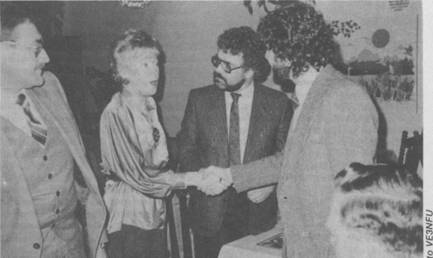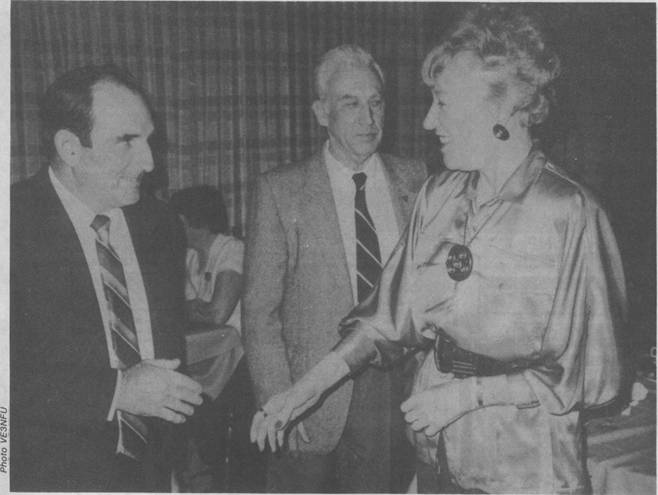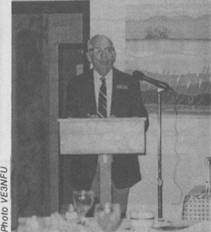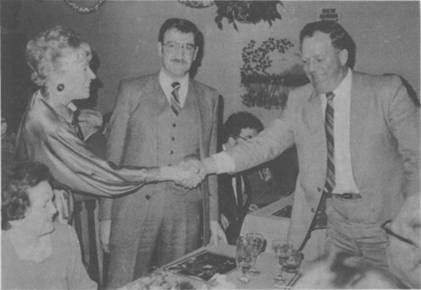|
1987
Flora MacDonald, M.P., Minister of
Communications
addresses Kingston
Club
(c) CARF Publications, Reprinted with permission
|

"Tho' they may gang a kennin wrang, to step aside is human," counsels
Flora
MacDonald as she shakes hands with Paul Cook, one of her Department's
Radio
Inspectors, while Bill Holland, another R.I., and Corporal Bruce McKenna, Kingston Township Police (L) looks on.
|
The Kingston, Ontario,
Amateurs are doubly fortunate. They have a fine, active club, and their Member of
Parliament is the Honourable Flora MacDonald, Minister of Communications.
We all are fortunate,
too, that she was kind enough to attend the Club's meeting on Dec. 12 last year, and
to address them on subjects of great interest to us all.
The Canadian Amateur is proud to reproduce,
for all Canadian Amateurs, the speech she gave there.
A dinner
meeting was held by the Kingston Amateur Radio Club on Dec. 12, 1986. Attending
were 65 persons with
many XYLs. Guest of honour was The Honourable
Flora MacDonald, P.C., M.P., Minister of Communications. Other
guests were two
police officers, Inspector Paul Flewelling and corporal
Bruce McKenna. From
the DOC office were
radio inspectors Paul Cook and Bill Holland. Also present was
fire chief Walter Bush from Kingston
Township Fire Department.
The
dinner was held at No. 9 Legion, Kingston. Following the dinner KARC president George VE3LXA
introduced the new
executive of the club and guests. He then called
on Bob VE3SV to
present the club's activities for the past year. This
should have
impressed the guests with the clubs
capabilities for emergency communications.
Flora
then gave an excellent speech: she discussed RF
susceptibility and
pledged the support of her department in the Ravenscroft case.
Flora was thanked by Norm VE3NFW.
The club
president for the second year is George VE3LXA,
vice president is
Don VE3MNE and
treasurer is Eric VE3XE. Secretary for the third year is Bill
VE3NFU. Program directors are Bill VE3PBL, Jean VE3MNI and Norm VE3NFW.
It was a
great evening and the club hopes to hold another next
year with more in
attendance as we were limited to 65 seats for the
dinner.- VE3NFU.

Flora MacDonald and Kingston Fire Chief Walter Bush meet, as Bernie VE3NB looks on.
Here's the Minister's
speech:
Ladies and Gentlemen,
What a pleasure it is to be with you this evening, in this
Legion Hall, sharing Christmas dinner.
As the holiday season comes around, one always feels the need to be among
friends, among those with whom we share common experiences and a similar
background.
Tonight, here in Kingston, a city which has become my home and
which I have been honoured to represent in Parliament for over 14 years, I feel
truly close to my roots, even though I was born in Cape Breton.
This is because it is a marvellous circle of events that has
brought me here this evening to address the Kingston Amateur Radio Club as
Canada's Minister of Communications.
|

"That amplifier's acting up
again," thinks Bob
Boyd VE3SV as he addresses the meeting.
|
As some of you know, I have a longstanding personal interest
in the communication field. As a matter of fact, I grew up immersed in the
communication world -
my father was the senior telegraph operator in North
Sydney, Nova Scotia, at the North American end of the transatlantic cable.
The Kingston Amateur Radio Club is fortunate to have present
and past members like Herbert Walsh and Buster Doubleday who, as former landline
telegraphers, have taught you firsthand of the importance of that transatlantic
cable, particularly during the second World War.
It seems almost inconceivable today that during that war, the
only way Winston Churchill and Franklin D. Roosevelt could communicate, other
than travelling by boat to speak in person, was through Morse Code messages over
that submarine cable.
But that's the way it was, not all that long ago. So my father, in the course
of his duties, played a role in some of the most important discussions of the
Allied Leaders, by retransmitting them down the line.
Even today, despite our capacity to instantaneous worldwide
mass
communications, dedicated individual are still the most important an indispensable part of our communication networks.
Amateur radio operators
provide on of the
clearest illustrations of this truth Over the years you and your fellow operators have frequently
played a vita role as messengers
and good samaritans, retransmitting crucial
information along the line when more
routine links were no available.
The
professional and dependable manner in which amateur radio operators conduct
themselves in such situations has earned you a very positive image with the
general public. And it is not only in times of accident or disaster that you
earn our gratitude.
Sometimes
it's for as simple a matter as passing along a family greeting for those who
might not otherwise be able to let each other know that they care. Like at
Christmas.
I know that members of your club have long been involved in phone patching
activities and that your most senior member, Mr. Charles Millar, has even been
specially commended by the Canadian Armed Forces for his work in this field.
EMERGENCY SERVICES
Mr. Millar, as a new year approaches in which you will celebrate both your
82nd birthday and the 57th anniversary of your radio licence- an impressive and
perhaps unequalled milestonepermit me to express my good wishes and my sincere
thanks for your outstanding service to Canada.
|

Flora MacDonald and Inspector Paul Flewelling shake hands while Corporal Bruce McKenna
looks on. Gaels and Celts everywhere.
|
You exemplify the public-minded spirit that has characterized the Kingston
Amateur Radio Club throughout its nearly four decades of existence, since its
beginnings shortly after the Second World War as the Kingston Civil Defence
Amateur Club.
The citizens of Kingston are grateful for your contribution to emergency
preparedness through participation in exercises with the police and fire
departments here.
They appreciate the help you have offered to the hearing impaired by
constructing accessory devices for them.
They recognize the invaluable assistance you offer to one of our popular
regional attractions by coordinating the sailing events at the Canadian Olympic
Regatta at Kingston (CORK).
And they acknowledge the importance of the amateur radio station you were
instrumental in establishing at St. Mary's on the Lake Hospital.
Yes, amateur radio operators have distinguished themselves as friends when
times are good and as heroes in times of trouble. They have also made a name for
themselves as researchers, forever pushing back the limits of their technology.
For all of these reasons, and because of their very responsible attitudes,
they will continue- you will continue- to use the spectrum with full public
approval.
CROWDED SPECTRUM
At the same time, of course, you know as well as I do how crowded the
spectrum has become. It is an increasingly complex task to accommodate the
rights of access of many diverse spectrum users. Business, official,
entertainment and personal uses of the airwaves must coexist without one user
interfering with another.
To take just one example, problems occasionally arise with badly designed
microelectronic circuits.
As more and more manufacturers introduce microchip technology into household
appliances, toys, office equipment and even vehicles and aircraft, there is a
growing risk of problems associated with radio frequency interference from a
wide range of sources.
My department, in consultation with spectrum users across Canada, has had a
key role in bringing this problem to the attention of the international
community.
RFI
GUIDELINES
We proposed the first international guidelines for manufacturers to follow in
making electronic systems immune to interference. These early guidelines have
since been upgraded and have helped to reduce the problem to a certain extent.
However, there has been an explosive growth in the use of digital electronic
circuits in products from all corners of the globe, and we are concerned that
the manufacturing sector has not, as a whole, fully taken the problem of
immunity into account in the design and manufacture of consumer electronic
equipment.
This problem has reached the stage where we, as a country, need to actively
consider options such as legislative action to give substance to the guidelines
and standards developed by government and industry.
GENTLY DOES IT
However, let me make it clear that we will not rush to impose the heavy hand
of government regulation unless absolutely necessary, particularly if we must do
it outside an international framework of standards.
You in the amateur radio community understand better than anyone the
importance of international good will to your activities. You have both
produced and thrived on such good will in the past. We can hardly proceed
without it in the present.
Moreover, government regulation may put constraints on the amateur community
or risk imposing unnecessary costs on consumers and users of electronic
equipment. Such equipment is essential to our wellbeing, both culturally and
economically. Impeding its availability would have significant negative effects.
As in many areas of public policy, a judicious balance will have to be struck.
You can be assured that the matter is of great concern to me and the
department and that your views and interests are being taken into account.
We recognize that this issue of electromagnetic compatibility is one which is
of concern to you as amateurs. I want to assure you that I, too, am concerned.
My officials have followed the initial trial of the Ravenscroft-Houghtby civil
suit in a lower level court. You are all familiar with that outcome.
THE RAVENSCROFT CASE
I note that the appeal process is under way, and my staff and legal counsel
are studying the grounds for appeal which have been prepared by Mr.
Ravenscroft's counsel. Consequently, I do not propose to discuss this specific
matter any further.
Compatibility and immunity issues, of course, are part of the larger goal of
ensuring harmony in the management of the spectrum, which we see as a vital
public resource.
To this end, as I am sure you are all aware, Parliament is presently
considering legislation to ensure the financial equity and prudent
administration of the government's spectrum management activities.
The purpose of Bill C-3 is to ensure that the costs of planning and managing
the radio spectrum are shared equitably among its direct beneficiaries.
Nevertheless, I would like to assure you that the government recognizes the
special situation and spectrum needs of Canadian municipalities. Therefore, no
change will be made to the licence fee structure for municipalities and
volunteer fire departments as a result of Bill C-3.
SPECTRUM PRESSURES
Amateur radio operators have historically enjoyed a remarkable share of the
spectrum as their exclusive turf. This is because of their traditional role in
communications, public safety and radio experimentation, as I described
earlier.
Nevertheless, pressure is forever being brought to bear on Canada and other
members of the International Telecommunication Union (ITU) to relinquish part of
this very valuable airspace.
There are suggestions, for example, that short-wave broadcasters should be
given some of your existing space in the 40 metre band, and that mobile land
services such as pagers and dispatchers be allowed to use some of your space in
the band between 144 and 148 MHz.
In another country, one more subject to commercial pressures, your spectrum
share might be gobbled up quickly. We here in Canada are not prepared to be so
hasty.
Spectrum
managers have a longstanding relationship of trust and respect with amateur
radio operators. As a result, you have access to a very generous portion of the
spectrum.
You are
allowed to use great amounts of radiated power, larger than any user other than
broadcasting. Much of this is due to your traditional role as radio explorers.
I would only ask you to bear in mind that, as your Minister of
Communications, I am responsible to oversee the spectrum for all users.
Moreover, radio is not something that stops at national boundaries. We have to
bargain and negotiate continually for your rights, in a forum which is very
competitive.
Even in Canada alone, we have seen unprecedented growth in both the uses and
the users of the airwaves.
In the past 40 years, the number of radio licences in force in Canada has
risen over 100 times, to three quarters of a million in 1986.
In half that time, mobile 'stations have grown in number from 60,000 to over
half a million. These figures do not include the 355,000 stations licensed in
the general radio service.
IT'S CROWDED OUT THERE
As of November 1986, there were 23,590 licensed amateurs using the airwaves
in Canada.
Seven categories of radio stations existed in Canada in 1914. Thirtythree
exist today to accommodate the innovative uses to which radio has been put since
then.
In other words, it's crowded out there! So I'm basically asking you to look
both ways when you step into the traffic. We don't want anyone hurt.
Amateur radio operators enjoy their historic status because they have had to
pass rigorous examinations before being licensed and because they have, on the
whole, been self-policing.
I know that I can rely on you to continue demonstrating your traditional
professionalism as the spectrum becomes more and more crowded, and as our
society comes to depend on sophisticated electronics in every area of life,
creating the potential for interference problems like those I mentioned earlier.
Our trust in you finds tangible expression in the licences you are awarded.
Many amateur radio operators have complained in recent years, however, that our
licensing requirements and exams seem outdated.
I can understand why some of you would wonder why you need a certain
proficiency in Morse code to be licensed today.
Or why those of you who can go into a store and purchase equipment would
wonder why you need to know how to build a radio.
EXAM CHANGES
In response to your concerns, we recently circulated some proposed changes
to regulation and policy.
We proposed a two-tier approach which would open the door to a novice with
an interest in radio and some money for equipment. Such persons would have an
operator's certificate after some 40 hours of basic training and would be
permitted to operate at a o very low power.
Those who still wished to experiment and
tinker with radio would continue to be encouraged with a higher level of
licence.
We have had several hundred responses to these proposals, from across the
country, roughly one-third were in favour of the proposals in our 'Amateur
Restructuring Paper.'
Another third were in favour with suggestions or had minor reservations,
and the rest were not in favour unless there were major modifications.
These comments are being carefully evaluated and compared. New draft
regulations and policies will be prepared during the course of the next year.
We welcome any further recommendations you may have.
But I am glad to have this chance to tell you in person how much we
appreciated hearing from all those of you who have made suggestions already.
In closing, I would like to repeat that the Canadian government recognizes
you, the amateur radio operators of our country, to be good citizens of the
airwaves, performing a valuable public service and practicing a very enriching
activity.
We look forward to further friendly cooperation in the future as we work
toward the common goal of maintaining the radio spectrum as a medium of
information and public safety for all Canadians, and as a source of personal
satisfaction for all of you.
Thank you. |

